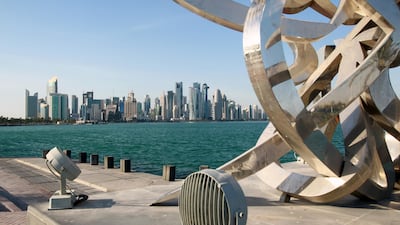The Saudi-led alliance that severed ties with Qatar reinstated a list of 13 demands that must be met before talks to resolve the eight-week crisis could start, just as as fresh economic data highlighted the impact of the unprecedented boycott on the Gulf nation.
The foreign ministers of Saudi Arabia, the UAE, Egypt and Bahrain said there would be no compromise until Qatar ends its support for terrorism -- a charge it has repeatedly denied. The bloc had initially dropped the conditions, which included shuttering Al Jazeera television, and instead referred to six broad principles it said Qatar must agree to, fueling speculation that the crisis could soon be resolved.
The four countries severed their diplomatic and transport links with Qatar on June 5, accusing the government in Doha of backing extremist groups in the region. Qatar denies the charges.
Net international reserves dropped 30 per cent in June to 88.85 billion riyals, according to the central bank. Data released last week showed that foreign deposits at Qatar’s banks fell the most in almost two years last month as customers withdrew funds, pressuring liquidity available locally for businesses and the government.
The decline in deposits squeezed liquidity, so the central bank used reserves to “ease the crunch and to preserve the riyal peg against the dollar,” said Mohamed Abu Basha, a Cairo-based economist at EFG-Hermes, a regional investment bank. "But the drop is not that alarming in a wider sense” given that the reserves don’t include the foreign assets of the sovereign wealth fund, he said.
Qatar’s isolation has forced the nation to open new, more expensive, trade routes to import food, building materials and equipment. Imports also dropped 40 per cent compared with the same month a year ago.
“The disruption of trade routes will weigh on non-oil economic growth, which was already on a slowing trend,” Abu Basha said. “But even the new trade routes are likely to be more expensive than the older ones, which will affect growth and public finances.”
To be sure, Qatar still boasts one of the world’s largest sovereign wealth funds, whose holdings include stakes in companies such as Glencore and real-estate landmarks such as the Shard in London. The boycott hasn’t affected its exports of liquefied natural gas.
*Bloomberg

